| Srl | Item |
| 1 |
ID:
076034
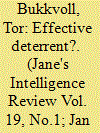

|
|
|
| 2 |
ID:
109489
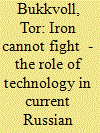

|
|
|
|
|
| Publication |
2011.
|
| Summary/Abstract |
Contemporary Russian military theory is dominated by three schools of thought: the 'traditionalists', the 'modernists' and the 'revolutionaries'. On the role of technology in future warfare, the traditionalists argue for both high tech and massive forces at the same time. The modernists are ready to trade manpower for technology, whereas the revolutionaries give technology full priority. Both the traditionalists and the modernists believe Russia, because of the country's technological lag and limited resources, should respond asymmetrically to the Western technology challenge. The revolutionaries, on the other hand, maintain that Russia must respond in kind. If not, the country will no longer be able to defend its sovereignty. The currently ongoing radical reform of the Russian military is a partial victory for the modernists, but which model or mix of models that will dominate in the future is first of all dependent on the Russian military's purchasing power and the state of the domestic defence industry.
|
|
|
|
|
|
|
|
|
|
|
|
|
|
|
|
| 3 |
ID:
142643
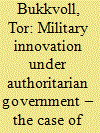

|
|
|
|
|
| Summary/Abstract |
Russian Special Forces saw significant changes to both organization and doctrine in the years after 2008. The special forces of the General Staff’s Main Intelligence Directorate were reduced in number, the organization’s institutional autonomy and rationale were changed, and an entirely new Special Operations Command was established in March 2013. This article seeks to assess the nature, scope and purpose of these changes, and to explain them by drawing on scholarship on military innovation. In particular, the article looks at military innovation in the context of a non-democratic political regime.
|
|
|
|
|
|
|
|
|
|
|
|
|
|
|
|
| 4 |
ID:
188318
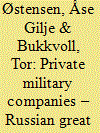

|
|
|
|
|
| Summary/Abstract |
In a situation where the Russian national self-image and economic realities fail to add up, this article discusses whether Russian private military companies have become low-cost tools to restore Russian great power status. Our findings suggest that whenever these companies are used in a ‘power as outcome’ way, they appear less successful at adding great power status on the cheap and less useful at elite enrichment. In contrast, PMCs seem well suited to make power contributions, and for a low cost, in a ‘power as prestige’ way. In these settings they are also more suitable instruments for informal elite earnings.
|
|
|
|
|
|
|
|
|
|
|
|
|
|
|
|
| 5 |
ID:
081060


|
|
|
|
|
| Publication |
2008.
|
| Summary/Abstract |
The change from Yeltsin to Putin has had minimal effect on Russian military corruption. Putin, despite his desire to rebuild Russian strength, has not shown himself willing or able to seriously deal with this problem. The fluctuations in the level of military corruption in the post-Soviet period seem largely to be explained by changes in availability of things to steal or embezzle. Thus, the latter years' substantial increases in defense spending have been accompanied by a steep rise in military corruption. Today, Russian military corruption is one of the main obstacles to military reform in Russia and to Russia serving as a partner in international military cooperation. It might also make the traditionally pro-military Russian public loose faith in the country's armed forces
|
|
|
|
|
|
|
|
|
|
|
|
|
|
|
|
| 6 |
ID:
171139


|
|
|
|
|
| Summary/Abstract |
The annexation of Crimea and the Russia enabled rebellion in Donbas created a need for radical improvements of Ukrainian military capability. This study discusses how different, mostly domestic, reform drivers and reform impeding factors had impact on the pace of Ukrainian top-down defence reform in the period since the confrontation with Russia started in 2014. It concludes that reform has been uneven, and that while vested organizational interests and dominant organizational ideas explain much of the slowness of reform, also corruption played a significant role. Furthermore, the Ukrainian case demonstrates how foreign pressure was important to facilitate reform even in a country that found itself facing the danger of major war. Nevertheless, the study does confirm previous findings that a “threat of defeat in war” in the end overcome domestic restraints to defence reform.
|
|
|
|
|
|
|
|
|
|
|
|
|
|
|
|
| 7 |
ID:
159546
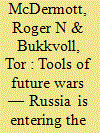

|
|
|
|
|
| Summary/Abstract |
Conventional high-precision weapons play an increasingly important role in the defense of Russia. They may also in the future be important in bilateral conflicts where Russia wants to force its will through. In general, the Russian debate on these weapons is more preoccupied with defensive than offensive scenarios. However, there are also those who argue that (a) conventional high-precision weapons are likely to increase the role of military force in foreign policy generally around the world; (b) for Russia they may be particularly efficient in conflicts with highly developed states, since these states are especially vulnerable because of their high concentration of critical stationary installations; and (c) these weapons may be particularly efficient in combination with other military capabilities.
|
|
|
|
|
|
|
|
|
|
|
|
|
|
|
|